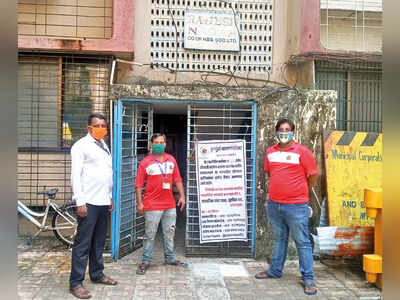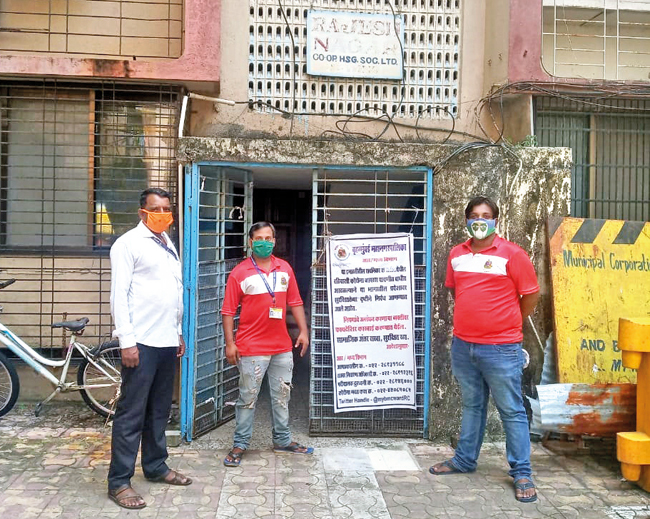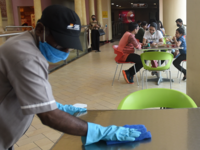Super-spreaders of Borivali

BMC officials outside Rajesh Co-operative Housing Society in Borivali.
We’ve found that some families even eat meals with infected relatives so they don’t feel like outcasts, BMC officials tell Mirror.
BMC officials told Mirror on Saturday that 2,793 people who tested positive for Covid-19 in Borivali West and chose to isolate at home ended up infecting 5,000 other people as they continued to mingle with family members. This, the officials said, is the main reason why R Central ward, which encompasses Borivali West, is now reporting far more cases of Covid-19 every day than any of the city’s 23 other wards. The ward reported 239 cases on October 2, 240 on October 3, and 257 on October 7, while the other wards have been reporting around 100 cases a day on average. R Central ward thus has more active Covid-19 cases — 2,625 — than any other ward, and a growth rate of 1.35%, way above the city’s average of 1.05%.
Dr Bhagyashree Kapse, assistant commissioner, R Central ward, told Mirror that underIndian Council of Medical Research (ICMR) guidelines, any person with Covid-19 who has no symptoms or mild symptoms, and a separate toilet for themselves, can choose home isolation. She added, “However, many such people don’t isolate themselves from their family members or even follow social distancing norms, and end up infecting their family members. Around 7,000 people who live in buildings in Borivali West have tested positive, and 5,000 of these are from the same households as the 2,793 people who had opted for home isolation.”
“This kind of carelessness at home has caused the surge in Borivali West. We are now persuading people who opt for home isolation to ensure that other members of their families don’t get infected. We take a written declaration to this effect from them,” she said.
Officials from the ward’s Covid-19 war room also telephone families of infected people and insist that they get themselves to the BMC’s Covid Care-2 centres rather than isolate at home if they are elderly, pregnant, or have comorbidities. “People must make use of our facilities instead of risking the lives of their family members. When such a person still opts for home isolation our war room telephones their physician to learn more about the patient and ensure that he or she is admitted to a care centre or a hospital at the earliest,” said Kapse.

Apart from this, she added, many residents of sealed floors or buildings venture out, putting the lives of others at risk. On October 6, R Central ward officials filed a police complaint against 55-year-old Ravi Nair fromRajesh Co-operative Housing Society in Borivali, saying he ventured out for work despite his floor being sealed. The police registered an FIR against him under Section 188 of the Epidemic Diseases Act.
Kapse said Nair, a freelancer, would telephone BMC officials and abuse them. “He would visit my ward office despite his floor being sealed and insist that we sanitise the building. He lived on the ground floor, where other people were in isolation. There were also six positive cases in flat 301 and another in flat 407. He was under the high-risk category, yet was merrily roaming around for work,” she said. Kapse added that they have even found residents of sealed floors letting their domestic workers in.
To impress upon people the importance of following the rules, Kapse has had Zoom calls with various residents associations. “I tell them that it isn’t just the BMC’s responsibility to protect them from the virus. They are responsible for it too. But people are not co-operating. I cannot deploy people at 1,300 buildings around the clock. If we find 10 cases on different floors of a building, we seal the entire building.” Residents of slums, she said, are usually more disciplined than those who live in buildings.
Kapse added, “I have conducted 282 camps in buildings so far. We screen all the residents and segregate the suspected Covid patients. We then conductantigen and RT-PCR tests and find at least eight cases in every building.”
Another problem, she said, is that many people in the area have begun eating street food again. “Such people are playing with their lives. I have started conducting tests on hawkers and taking action against those who don’t practise good hygiene,” she said. R Central ward is also second in terms of the number of people fined for not wearing a mask. “We have taken action against 2,000 such people so far,” Kapse said.
BMC officials told Mirror on Saturday that 2,793 people who tested positive for Covid-19 in Borivali West and chose to isolate at home ended up infecting 5,000 other people as they continued to mingle with family members. This, the officials said, is the main reason why R Central ward, which encompasses Borivali West, is now reporting far more cases of Covid-19 every day than any of the city’s 23 other wards. The ward reported 239 cases on October 2, 240 on October 3, and 257 on October 7, while the other wards have been reporting around 100 cases a day on average. R Central ward thus has more active Covid-19 cases — 2,625 — than any other ward, and a growth rate of 1.35%, way above the city’s average of 1.05%.
Dr Bhagyashree Kapse, assistant commissioner, R Central ward, told Mirror that under
Kapse said that many families of Covid-19 patients under home isolation have told BMC officials that they eat meals with their infected relatives so as not to make them feel like outcasts. “Entire families have tested positive as they didn’t take the necessary precautions. People under home isolation must take utmost care by cleaning their utensils and washing their clothes separately from the rest of the family,” she added.
“This kind of carelessness at home has caused the surge in Borivali West. We are now persuading people who opt for home isolation to ensure that other members of their families don’t get infected. We take a written declaration to this effect from them,” she said.
Officials from the ward’s Covid-19 war room also telephone families of infected people and insist that they get themselves to the BMC’s Covid Care-2 centres rather than isolate at home if they are elderly, pregnant, or have comorbidities. “People must make use of our facilities instead of risking the lives of their family members. When such a person still opts for home isolation our war room telephones their physician to learn more about the patient and ensure that he or she is admitted to a care centre or a hospital at the earliest,” said Kapse.

R Central ward officials recently lodged a police complaint against a 55-year-old resident of the building, saying he ventured out for work despite his floor being sealed
Apart from this, she added, many residents of sealed floors or buildings venture out, putting the lives of others at risk. On October 6, R Central ward officials filed a police complaint against 55-year-old Ravi Nair from
Kapse said Nair, a freelancer, would telephone BMC officials and abuse them. “He would visit my ward office despite his floor being sealed and insist that we sanitise the building. He lived on the ground floor, where other people were in isolation. There were also six positive cases in flat 301 and another in flat 407. He was under the high-risk category, yet was merrily roaming around for work,” she said. Kapse added that they have even found residents of sealed floors letting their domestic workers in.
To impress upon people the importance of following the rules, Kapse has had Zoom calls with various residents associations. “I tell them that it isn’t just the BMC’s responsibility to protect them from the virus. They are responsible for it too. But people are not co-operating. I cannot deploy people at 1,300 buildings around the clock. If we find 10 cases on different floors of a building, we seal the entire building.” Residents of slums, she said, are usually more disciplined than those who live in buildings.
Kapse added, “I have conducted 282 camps in buildings so far. We screen all the residents and segregate the suspected Covid patients. We then conduct
Another problem, she said, is that many people in the area have begun eating street food again. “Such people are playing with their lives. I have started conducting tests on hawkers and taking action against those who don’t practise good hygiene,” she said. R Central ward is also second in terms of the number of people fined for not wearing a mask. “We have taken action against 2,000 such people so far,” Kapse said.
GALLERIES View more photos















